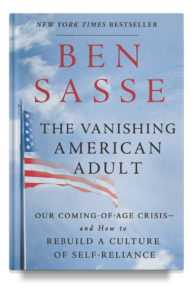What the critics are saying about Senator Ben Sasse’s new book, Them.
This Fall, Senator Ben Sasse released a new book entitled Them: Why We Hate Each Other and How to Heal. In the book, he tackles how massive disruptions in American life have left us disconnected and despairing. Angry partisan tribalism has increased as our healthy, neighborly ties have decayed. As he puts it, “Lacking meaningful attachments, people are finding a perverse bond in sharing a common enemy.”
Is Sasse on to something? Here’s how critics have reacted to Them.
In his column on the book, George Will observes that the problem Sasse has chosen to tackle is not an easy one:
If Senator Ben Sasse is right — he has not recently been wrong about anything important — the nation’s most-discussed political problem is entangled with the least-understood public-health problem. The political problem is furious partisanship. The public-health problem is loneliness. Sasse’s new book argues that Americans are richer, more informed and “connected” than ever — and unhappier, more isolated and less fulfilled. …
Repairing America’s physical infrastructure, although expensive, is conceptually simple, involving steel and concrete. The crumbling of America’s social infrastructure presents a daunting challenge: We do not know how to develop what Sasse wants, “new habits of mind and heart … new practices of neighborliness.” We do know that more government, which means more saturation of society with politics, is not a sufficient answer.
Is this just another thinly disguised campaign book from an elected official? Not by a longshot. NPR notes the lack of simple solutions in the book, and the warning that these problems cannot be solved by politicians:
The most striking thing about Them is that it doesn’t read at all like a campaign book, and that’s a good thing. There’s no soft-focus autobiography, no humble-bragging about his accomplishments in the Senate. Sasse is an excellent writer, unpretentious, thoughtful, and at times, quite funny — reflecting on alt-right provocateur Milo Yiannopoulos, he notes that “sometimes the enemy of your enemy is just a jackass.” …
Sasse’s solutions, including spending less time on screens, putting down roots and building community — investing in “social capital” — all focus on taking personal actions rather than on policy initiatives. He’s aiming to change a shifting way of life — what he says is the heart of the problem. Through these moves, he suggests, we as individuals work back to an America that used to be — one where families were at the core, and relationships with friends and neighbors took priority over political leanings.
And what if we can’t follow Sasse’s challenging recommendations? The stakes are high indeed. As the Guardian says:
What makes Them worth the read is Sasse’s amalgam of realistic alarm and warning. In his words, “we are in a period of unprecedented upheaval. Community is collapsing, anxiety is building, and we’re distracting ourselves with artificial political hatreds.”
“That can’t endure” writes Sasse. “And if it does, America won’t.”
Read an excerpt from Sasse’s book, Them, here.

 A101 Team
A101 Team 